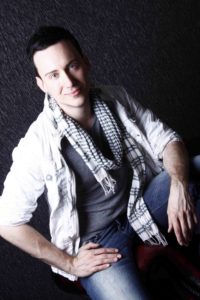Carlo Bosticco, Actor, Singer and multifaceted Artist with a conjoined Anglo-Saxon and Hollywood background, talks about Art. – Interview.
Condividi questo articolo:
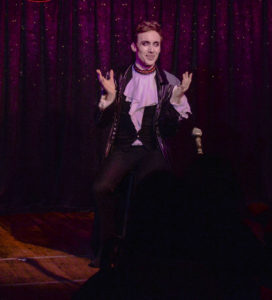 by Andrea Giostra.
by Andrea Giostra.
“Il Profumo della Dolce Vita” met Carlo Bosticco, artist and actor born in Alba, a Piedmontese city with an ancient history – the earliest findings of the city date back to the Neolithic period (between the 6th and the 3rd millennia B.C.). – Alba is rich in cultural events, some of which even contributed to the Unity of Italy. One of the most significant one was the flourishing of artistic and literary activities, chief amongst which the “Philharmonic-Literary Academy” created by Odella, that gathered many illustrious intellectuals in the ‘700 and ‘800; amongst them Silvio Pellico (1789-1854), writer, poet and Italian patriot, author of the famous “Le mie prigioni”, published in 1882 and read throughout Europe, as well as Giovanni Prati (1815-1884) poet and politician of that cumbersome period in which “Italy must be made”.
Carlo Bosticco is born and bread in this city, rich in culture and architecture, one of the most beautiful in Italy. Nowadays Alba is also famous for its important products, such as wine, the extremely pricey truffle and, above all, Nutella, renown world-wide. This is Carlo’s social, cultural and artistic matrix, and this is a factor surely not to be underestimated, according to the significant phenomenological perspective by Martin Heidegger (1889-1976) which strictly relates the Man and the Artist to his Home, his ancestral, cultural and ontological origins.
Since childhood, guided by an almost innate instinct for acting and Art, Carlo performs his first shows for his parents, using puppets and dolls to reenact the adventures of heroes from Greek Mythology. His first theatre experiences are in the acting laboratory at the “Liceo Classico G. Govone” in Alba, where he was a student; it is there that he discovers his talents. This will be the subject of the conversation in this interesting interview-conversation with Andrea Giostra.
Hello Carlo, and welcome to our magazine. Thank you for accepting our invitation to converse with us. I must be honest, I am really curious to see what will emerge, considering you are a consummated, multifaceted artist with an enviable career.
The first thing I ask of the artists I interview is to introduce themselves to our readers in simple words as men, more than as an artists. You are a young actor, but a very determined one and gifted with an artistic talent due in part surely to your Italian roots and your city in particular, where culture is akin to air or bread! If you were to introduce yourself to our readers, what would you say?
Hi Andrea and thank you for the introduction. Hmm… such a simple question and I’m already floundering! I hope that knowing me as an artist is the same as knowing me as a man: my Art and my characters are always extensions of my inner self. If I had to describe myself I would say I am a “mystic jester: I am histrionic, nonsensical, sparkling, yet, just like the jesters of ages past, I made of delving deep into the soul of humans my private crusade. I love High Comedy and High Tragedy and I care little for what’s in between. I am a lover of all things “magical” and a great opponent of “realism”. I am a practicing Buddhist and I meditate every day. I believe in the importance of confronting one’s own demons and helping others to do the same. I believe that love is a muscle to be developed. I am a staunch vegan… but a nice one, I hope!
Nice introduction, Carlo. Simple, but effective and it gives a good picture of you!
Carlo, when and how did you discover your artistic talent, acting in particular? And when did you decide to make acting into your life’s profession, or life choice?
As you were saying earlier, I have always had a certain propensity for dramatics, from very early on. In the playground, I only invited to play with me children whom I considered convincing interpreters (games such as: “I am He-Man, you are “Spiderman”!). I was also prone to Pindaric flights of fancy: I remember that at my elementary school’s showing of “The three little pigs” I had insisted to rewrite the finale and I showed up as a unicorn with cut-out cardboard wings to chase away the Bad Wolf.
My high school had an afternoon theatre club that produced one Greek tragedy at the end of each year, guided by professional directors from Turin. I signed up straight away and not too long after I infiltrated deeply, becoming co-director. I was in charge of selecting music to accompany our version of “Antigone”, a medley of the texts by Euripides, Brecht e Anouilh, as well as performing on stage as the character of Creon. I also ended up directing many showcases for my singing class at the Conservatorio “Ludovico Rocca” of Alba. I got around!
At that point it was clear to everyone what my path would be. I remember that, at the “maturità” exam (the Italian high school diploma) the external committee asked me what I wanted to do after high school. “Acting!” I replied without hesitation. With a bead of sweat on his forehead he replied “Oh, good… and… what else?”. And I replied: “What do you mean: ‘what else?’ Acting!”.
Your mind was clear, Carlo! And this is good, because you were aware of which path you wanted to follow without hesitation, tortuous and filled with pitfalls as that path may be! But you did the right thing: we must follow our instinct and passion, otherwise, after a few years, we run the risk of developing regrets and resentment that can accompany us for the rest of our lives! Our soul points us the way even when we are very young.
What was your formation, Carlo? What were the acting schools you attended and why those? What do you want to tell us about your artistic and professional development?
Let’s say that the schools pick you, not the other way around: the places are few and the competition is fierce. I moved to London right after high school to audition for the most prestigious academies; I wanted to be able to reach a public as vast as possible, without limiting myself to Italy. My English at the time, though, was purely academic; I recall that preparing Shakespeare monologues was a true ordeal, just like asking a foreigner to recite Dante confidently, and my Italian accent was strong. I got lucky: I was noticed straight away by “Conti”, one of the oldest drama schools in London (the only one specialized in the American Meisner method, which concentrates on the actor’s need to remain “present in the moment”).
After the degree, my mother was shocked that the duration of the studies was so “brief” (university courses last three years in England). I followed her suggestions and decided to continue my training. I auditioned again and received some offers. The choice in the end fell between studying mime at the LeCoq Academy in Paris or a Masters in Musical Theatre at the “Royal Conservatoire of Scotland”. As much as I would have liked to perfect my French, my love for music and singing prevailed. I spent one year in Glasgow, attending the same school that prepared Alan Cumming, James MacAvoy, Richard Madden and many others.
Regarding writing, I’m completely self-taught, but my dramatic studies help me, without a doubt. I always write with in mind the objective to give my actors lines and situations that will allow them to shine.
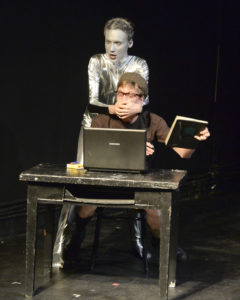 Your formation was wonderful and diverse, and in places where discipline is foremost: Art always requires discipline to allow an artist to express his innate talent. And I see you made some wonderful and tough personal choices!
Your formation was wonderful and diverse, and in places where discipline is foremost: Art always requires discipline to allow an artist to express his innate talent. And I see you made some wonderful and tough personal choices!
Carlo, what were the first difficulties you encountered during your experience as an actor? What was the hardest thing to overcome that you still remember today?
The culture shock with the Anglo-Saxon world. The expectations on what constitutes Art vary from country to country and aesthetics change with people. I think this is what lead me to expand my career to the United States. My Italian sensibility, more mannered and dramatic, is naturally appreciated there. In England, the prevalent acting style is a lot more contained, more repressed, while Americans are expansive like us. In the beginning, I was often told I was “too much” … I moved too much, I had too much passion, too much emotion, too much…
The process was frustrating but eventually very beneficial. I learnt the power that lies in channeling a great energy in a small focus point, an intense calm: my Latinate passion feeding a stillness and sobriety purely British.
I have seen it with many of my “foreign” colleagues: when finally, those worlds meet, the results are electric.
Carlo, you’ll probably know, having read a few of my interviews, that I am a great reader and I think that the greatest writers of the depth of the human soul in literature is Fëdor Michajlovič Dostoevskij. In one of his most beautiful novels “Notes from Underground”, published in 1864, he talks to us of the “Theory of Humiliation”. You know, Carlo, this concept traced by Dostoevskij was made into a real psychodynamic theory by scientists in the 90s. It became a real psychological model, and its assumption is that: “the humiliations that we are subjected to in our lives teach us to live better and make fewer mistakes: we learn from our experience and errors, especially when others point them out to us, even deriding us!”. What are your thoughts regarding this approach regarding the life and career of the Artist? Have you ever been subjected to humiliations that left a mark but at the same time gave you the motivation to go forward and become what you are today? Become an Artist with a consolidated story, even though still developing, as it is normal for all artistic and cultural professions?
Punishment, humiliation, sin, guilt… These are quite heavy distortions of a few Christian concepts that have been misunderstood over time. A somewhat medieval sensibility which, sadly, endures. In Buddhism, for instance, there is no concept of guilt or original sin. To explain: Buddha is not a divine entity separate from us, but rather simply the name of our highest potential. In other words: we are all divine! All sons and daughters of God and all equally wonderful. To humiliate ourselves and others (two faces of the same coin) is possible only when we forget this fact and ignore the intrinsic dignity of every human.
Sure, there are lessons to be learnt when we fall, but the lesson lies in finding the strength to stand up, remembering our own divinity.
Dostoevskij was observing how the human soul harbors a certain masochistic tendency, an attachment to pain and self-pity, and at the same time anger arising from having been victimized and humiliated; all this generates a vicious circle. If I am not mistaken, his was also a Theory of Love, indicating how the cycle of humiliation and suffering can be broken by developing Compassion.
There have certainly been many occasions in which I felt ashamed of my artistic results and judged myself. And even more moments when others tried to instill shame in me, colleagues or teachers, in the name of “honesty” or “improvement”. I had to spend a lot of energy to overcome these mini-traumas. In my experience, the more love one offers to the seed, the faster and more surprisingly it grows.
All the best directors I worked for had great respect for the efforts of their actors, and their results speak for themselves.
I like your answer Carlo! Even though humiliation is not only a western concept. It is something that belongs to human nature from when one is born and starts relating to others like him. In the end, humiliation is simply being mortified by someone who has a “higher” position than ours in that specific context, be it an academy, an Art school, a University, a social group, etc… It is the intention, perhaps a little sadistic, of some subjects who, from their narcissistic pedestal, offer to help their “pupil”, “disciple”, “helper”, “friend”, “partner, etc… by striking at his sensibility, his personality, ridiculing him in public and at the same time wounding his human and professional dignity! This certainly produces great and grave discomfort – whether justified or not – and frustration, shame and alienation: it is something we all have experienced, since our childhoods! It is a psychological phenomenon that spans all latitudes: we grow and fortify ourselves like this! There are no other ways! Your position is that of an adult that found in his religion a protective dimension that is wise and effective! But humiliations belong to the story of each human being in his development towards his mental, more than chronological, adulthood!
Carlo, the world of theatre, cinema and Art is a world full of traps and compromises. Often it is inhabited by little snakes that little have to do with it but infiltrate it for personal advantage; for instance, to seduce young artists with promises they cannot live up to, leading them down paths with no return. It is hard to find people that will sincerely help without a return.
I made this little introduction to ask what your parents told you when you communicated you wanted to become an artist, taking for granted that that which I said earlier was known to them also.
Thank heavens I never encountered such malice! My parents were the first to support me in my choice: I am very lucky. My father would say he sent me abroad to be sure I’d be far enough to never steal his slippers again. In truth I hope he is proud of what I am creating.
What do you think, Carlo, of that reality I described earlier, one which journalism often brought to light, in particular that of the
“little snakes that little have to do with the world of Art but infiltrate it for personal advantage?”
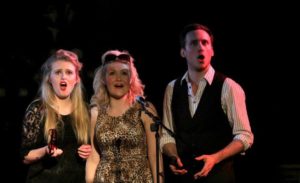 Luckily, the professional world of theatre and cinema is filled with individuals with great morals, especially near the top. I never had really bad or morally ambiguous experiences.
Luckily, the professional world of theatre and cinema is filled with individuals with great morals, especially near the top. I never had really bad or morally ambiguous experiences.
Certainly, snakes do exist, but in my experiences, they are not individuals; rather they are tendencies which can arise in anyone… jealousy, competition, a propensity to remain on the surface and to judge superficially, maybe haughtily…
I have to say I found them more often in the world of Musical Theatre, maybe because acting talent is less quantifiable, more subjective, a matter if taste; singing and dancing are more objective: can you hit a top C or no? Can you lift your leg over your head or no? That environment naturally heightens the tendency to compare ourselves to others, and that’s a true sentence for an artist. We must continually cultivate the respect for our own uniqueness, otherwise what we offer will diminish.
Maybe I do not meet particularly negative people because I make sure I’m surrounding myself with positivity and support. I built a real artistic family in New York.
Very good Carlo. This element has consistently come up in almost all my interviews – a hundred or so by now! Luckily the artists I met and with whom I was able to dialogue about the Arts – because like to think this is a dialogue, much more than a simple interview – were able to defend themselves and find their way.
Carlo, I would like to know your thoughts regarding a beautiful phrase inscribed on the façade of the Teatro Massimo in Palermo, famous because built by two of the greatest architects of the XIX century, Giovan Battista Filippo Basile and his son Ernesto Basile. The Teatro Massimo of Palermo, I am sure you’ll know, is the second largest in Europe and can flaunt acoustics on par with the National in Paris and the Staatsoper in Vienna.
The phrase is this: “Art renews people and reveals their life. Vain is amusement when it does not aim to lay the path for the future”. What comes to your mind hearing this phrase, what can you tell us? Take a moment.
I always objected to hearing Art reduced to mere “entertainment”. In Italy, perhaps it doesn’t happen as often, but abroad, where it is more commercial, it is common and the success of an artist is measured with sales.
I truly believe Art has a deep mission. In practice: there’s nothing else that can change the mood, the atmosphere of the life condition of a person like a song or a story. That’s why cuts to the Arts that so many governments are enacting are real criminal acts: murders of a country’s cultural identity.
Another side to this coin is that a lot of artists only aim to be entertainers, without minding the impact they can have. We have a great responsibility. I remember a quote by lyricist Sheila Davis: in coaching a young writer who had just created a licentious lyric for a young singer, in which the “protagonist” invited her lover to spend the night with her declaring herself “ready for everything”, Sheila asked her “How would you feel if this song encouraged even only one teenage pregnancy?”. Not to be puritans, but this is the reality of Art. People listen and absorb!
The objective of my work is always that to expand the consciousness of my audience. I really would like to create value in the lives of those who come into contact with my art, even if only by allowing them a better understanding of certain aspects of their lives or a subtle, less definable, source of inspiration; maybe even catharsis?
You touched on an important theme, Carlo: catharsis! You will know that it was Freud who gave catharsis a therapeutic value in ‘800. But this is a concept too vast for this interview! What I can say is – using another Freudian concept – the “projective identification” of the audience with the artist, when it is free of inhibitions, can surely bring the cathartic effect you mentioned!
Carlo, have you ever thought about abandoning this profession, not because of difficulties, but more just to try yourself in another sector? Or maybe there was an alternative profession you felt passion for in your childhood?
Something completely different from show-business and writing? I thought about it in the past, but never seriously. I would have liked to be a dolphin trainer! I loved them as a child. I even asked around and after discovering that a degree in marine biology as well as innumerable swimming diplomas were needed I lost interest. There’s also the dubious ethical aspect of keeping a cetacean captive… I still love them, though.
Working with dolphins, how beautiful: the dream of many children!
Carlo, would you like to tell our readers a funny anecdote about something that happened during your work? An episode that embarrassed you but makes you smile today? What would you like to tell us?
My first professional job in NYC was a version of Oscar Wilde’s Salomé, in which I played the prophet Iokanaan, or John the Baptist. As per script, I was trapped in a well, which the director had placed behind the audience and from where, during the first few scenes, I was heard shouting out my prophecies.
At some point, I notice something strange… the text of the prologue is different… It takes me a moment to understand: one of the actors onstage has forgotten his lines and, panicking, has started reciting his next speech skipping two entire scenes!
In the meantime, I am meant to be imprisoned in the well until one of the guards comes to collect me, but the moment of my onstage entrance is approaching soon… in three seconds, from stage right, on the other side of the auditorium!
I sneak out of the “well” and run out of the theatre! Running through the backdoor aisle I reach the wings just in time for my entrance. Crisis averted, right? No. In the meantime, the light technician hasn’t noticed anything and keeps doing his job as if nothing had happened… except now the actors are two scenes ahead of him. I am about to enter and begin my piece, when total darkness envelops the stage, except for one spotlight, which, by director’s choice, we should have been using for a monologue that got skipped. Salomé, by chance caught in the cone of light and not knowing what to do, starts randomly on one of her monologues… picked from the end of the show! Cold sweat. What should I do? By this rate the show will be over in the next 5 minutes. In a heroic attempt to save the day, as soon as the light changes, I enter and begin my speech, backtracking twelve scenes at least… The rest of the night was a collage of scenes in more or less random order, as the actors tried desperately to fill holes and gaps with the pieces of text they still hadn’t used. We had no way of communicating to one another: we all were onstage for the entire duration.
Our director’s face was something else. But the best thing is: the audience didn’t notice a thing. Not a thing!
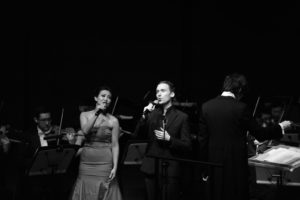 They probably thought it was an innovative version of the show and maybe were even intrigued by it! (I smile!)
They probably thought it was an innovative version of the show and maybe were even intrigued by it! (I smile!)
Who are the actors you appreciate the most today and the ones you would like to work with, and those you would like to “steal from” their way of making art?
Can I pick pieces from anyone like Frankenstein’s monster? Cool! I want Adam Lambert or Jeremy Jordan’ larynx (the best male voices of the moment), the emotional capacity of Jonsi from the Icelandic band Sigur Ros, the dramatic strength of Cynthia Erivo, the histrionics and courage of Dario Fo; as for writing I would like to spend one day in the head of Stephen Sondheim and Michael Frayn. And Shakespeare.
Who have been your life teachers and your professional teachers, the “Masters of Art” as they were called in the Italian Renaissance? Who are the ones you still remember and are inspired by to this day?
Someone I owe a lot to is certainly Anthony Drewe, the author of the version of “Mary Poppins” that Disney brought to the Broadway stage, as well as of many English musicals such as “Honk” and “Just So”. I met him when I had the chance to sing one of his songs for a workshop. We kept in touch. Since I am absolutely shameless I asked him to take a look at my first musical “Chasing Icarus”. He accepted immediately. It is incredible how such a successful writer, who received the highest awards of the theatre world, can be so open and available to share his knowledge. It is also beautiful to see how, even at the top of the pyramid, some manage to keep their artistic vision intact, without compromising themselves.
He is truly one of the most exquisite people I have met in the business and I am happy to consider him a friend.
Do you know that the “Greatest Men” are also the “Humblest Men”? Humility is the real greatness of an individual, not surely arrogance or presumption: those are weaknesses of empty people that have little to do apart from repeating what they learnt by heart! Great Men have everything in their head and no need to flaunt their culture or their Art, because they are so great even a blind man would see them in all their grandiosity! This is Art to me! And I see that you have had the luck to meet people with this quality and this talent. Do you still collaborate or keep in contact?
I keep in touch with Anthony. Just a little while ago I wrote some lyrics for one of his shows. He needed an Italian adaptation for one of the choruses of the song “In the eyes of Italian men”, from his musical “Travels with My Aunt” – from the novel by Graham Greene with the same title. It was an ode to the Latin charms of Italian men so I helped him happily. The show played in England at the Chichester Festival Theatre this past April, 2016.
Carlo, what are the jobs that you remember most fondly from the past two or three years, that had important critical success? And why those?
One of the jobs I am the happiest about is without a doubt “La Bohème ” by the company OperaUpCLose in London, a revolutionary version of the opera by Giacomo Puccini. The most amazing aspect of that experience was its unexpected success. We started off small: the director’s idea (Robin Norton Hale) was to make the opera accessible to the contemporary public. Low budget, only one piano and no orchestra, modern setting, English text; we were in a little theatre above a pub, “The Cock Tavern”. The focus was all on the story, the music and the relationships between the characters… a breath of fresh air in a genre such as opera that, in time, has become synonymous with pomp and grandiosity. Once devoid of ornaments, the whole show gave the impression of an almost voyeuristic experience: a window on the private lives of these young characters and their loves and drama.
Also, Robin had the idea to set the third act, which takes place in a tavern, in the actual pub underneath the theatre! The unaware audience went downstairs for a break, ordered a drink, and suddenly some of the barmen and customers started singing, revealing themselves to be actors! A true full-immersion in the world of the story. The public adored it so much that the show moved over to an important theatre, the “Soho Theatre”, earning extension after extension. In the end, we even won the Olivier Award, the equivalent of an Oscar or a Tony in British Theatre! I am proud of it. I really like to think that we changed the state of opera in England.
Another beautiful thing that happened involves me both as a performer and author. In 2016 one of my songs was selected by the important Chinese “Symphony Orchestra of Guiyang”. My piece “Stories Untold”, from my musical “Chasing Icarus” was chosen as representative of contemporary musical theatre and inserted in the program alongside the most famous exponents of the genre, “The Phantom of the Opera”, “Wicked”, “Les Miserable” …
It was a real adventure! My co-author and I, Matt Randall, traveled to China a week in advance to prepare for the evening and rehearse. I duetted my song with the Chinese Diva Aveta Chen, accompanied by over 76 extraordinary international musicians, while my lyrics were projected on a gigantic maxi-screen.
And there’s more: Matt, sat in the public, when the concert was over and the audience standing up, overheard his neighbor whistling our motif. Not Andrew Lloyd Webber’s o Sondheim’s… ours!
A great satisfaction which repays you of so much work and sacrifice. You can’t but be proud of it!
What are you working on right now, what are the works that your fans, admirers and followers will be able to enjoy soon?
They only have to turn on Rai2! I am collaborating on the script of the new season of the volleyball cartoon by Olympic champion Andrea Lucchetta: “Spike Team”; I am translator and adaptor on the project.
I am also working on the third draft of my show “Chasing Icarus” and we will soon have a full production. “Chasing Icarus” is written in English, but it’s an all-Italian story. Set in Rome in the 1700, in the world of early opera and its theatrical intrigue, a period in which the Vatican had forbidden women to sing in public, so generating the phenomenon of the “castrati”. The story is very dear to me; it’s about how seeking happiness outside of oneself is a distortion. Our protagonist, the young castrato singer Nero, makes big mistakes believing that other people’s validation and fame will give meaning to his existence. Love for oneself, hard as it is to find, is essential to find our place in the world. Even though it has a deep message, it is also a piece filled with funny moments. I took inspiration from the Comedies of Errors typical of Shakespeare: our heroine is a girl who disguises herself as a boy for the chance to perform on stage.
I hope that after New York and London we will also have the chance to bring it to Italy. It will be strange having to translate my own lyrics.
This could become another great satisfaction; even though you know they say “Nemo propheta in patria!”.
As a person who is so artistically busy as you, who must work intensely without breaks, how do you manage your private love life? Many Hollywood artists love saying: “to become a great actor you have to choose: either work or love”. Do you think that these great American actors, Golden Globe and Oscar winners, are right in saying so?
It’s a strong temptation: living the artistic vocation as a sort of religion to the exclusion of the rest; yet an artist that doesn’t live his or her own life has nothing to share onstage or on screen or in his or her writing. We must gather inspiration from the world, inner and outer, to then communicate our experiences through Art. I am trying to balance all aspects of my life, and believe me, at times I feel like I am a juggler. I am still a great romantic though, and I would always want my love life to be as epic as a Grand Opera (possibly without final suicide).
Carlo, this is a question I like a lot because it takes us back to one of the most beautiful time in out lives: childhood! Do you have a dream you’ve kept close to you since when you were young and you’d like to see realized? Can you tell your admirers what it is?
There are many! I must confess I am big “nerd”. I would love to play a character in a superhero franchise. If anyone from Marvel is reading, I am available! I don’t yet know which character, though… maybe a baddie? Sadly the God of Lies, Loki, is already taken… Maybe if they ever make the “The Young Avengers”, I am calling shotgun on Wiccan. Fantasy, is my great passion, and I’d be great: my ears are already pointy like an elf’s!
Break a leg for this beautiful artistic dream, Carlo! Thank you for dedicating your precious time to our Magazine, and thank you also for a brilliant and interesting conversation. We of
“ilprofumodelladolcevita.com” wish for you to reach each of your goals in your professional and artistic future.
Thank you again, and see you at the next interview!
Thank you, Andrea! Thanks to “ilprofumodelladolcevita.com” for this chance to chat about Art and Culture. I am sure we’ll meet again soon and break a leg to you too!
–
To learn more about Carlo Bosticco, you can consult the links listed below:

–
Carlo Bosticco – Official Web-Site:
www.carlobosticco.com ;
–
Carlo Bosticco – Official Facebook Page:
https://www.facebook.com/carlo.bosticco.18 ;
–
Carlo Bosticco – Carlo Bosticco Singing Reel:
https://www.youtube.com/watch?v=Sa5cJKd9GXQ ;
–
Carlo Bosticco – Symphony Orchestra of Guiyang, Stories Untold :
–
Readers wishing to know the author of Interview, Andrea Giostra, can consult his “Official Facebook Page” and his “Personal Facebook Page”:
–
https://www.facebook.com/AndreaGiostraFilm/ ;
–
https://www.facebook.com/andrea.giostra.31 .
